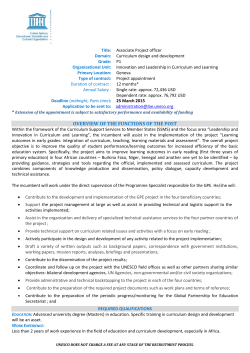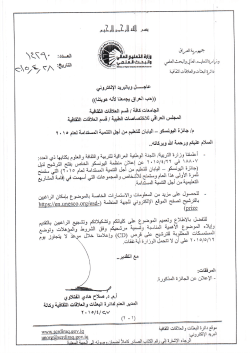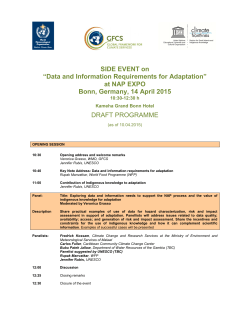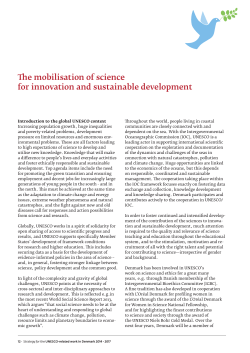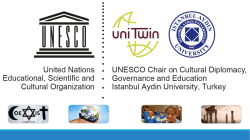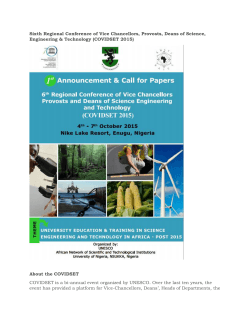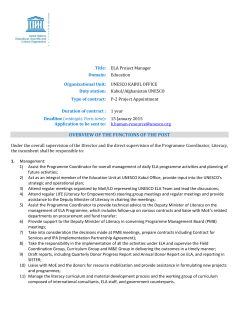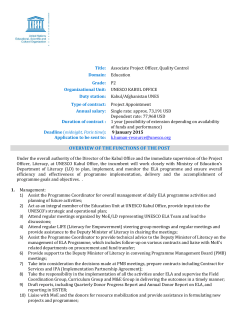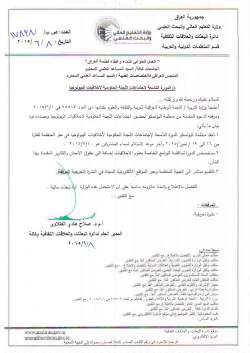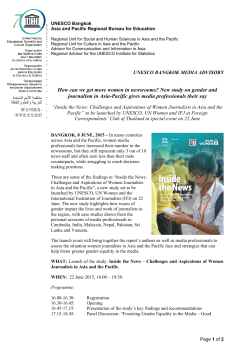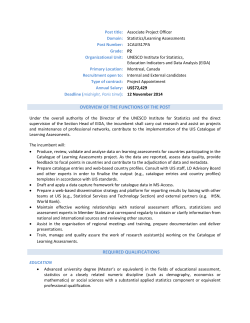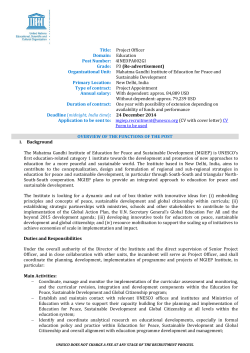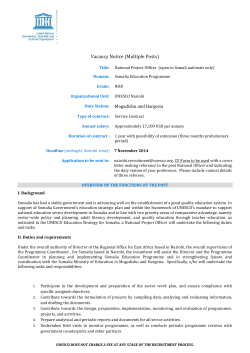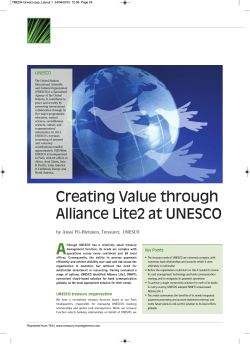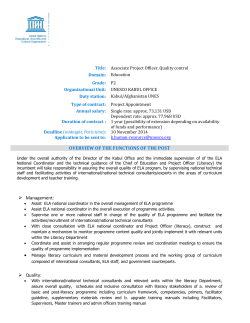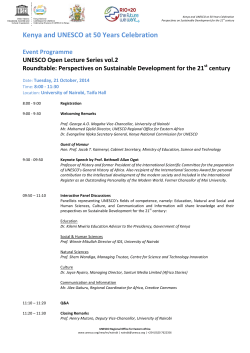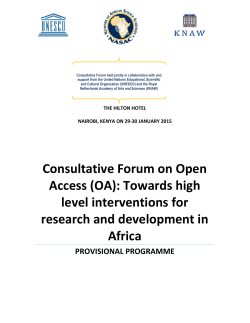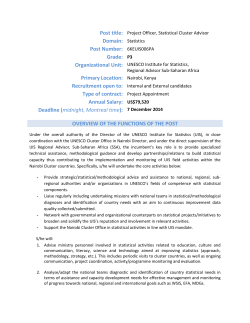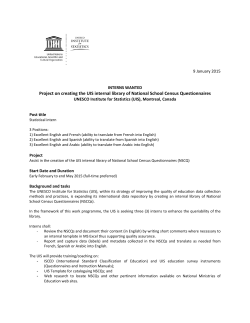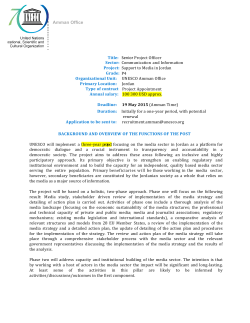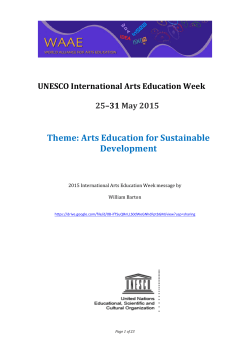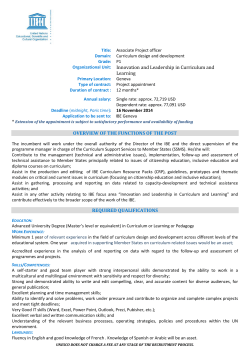
21 October 2014 Check against delivery Thank you Mr Chair,
Statement by Sweden at the 195th UNESCO Executive Board Session, October 2014 21 October 2014 Check against delivery Thank you Mr Chair, Sweden aligns itself with the EU statement. The last time the Board met, I spoke about Swedish journalist Nils Horner, who was murdered in broad daylight in Afghanistan while covering the election campaign. Unfortunately, more murders have followed. We have all seen the horrible pictures of the brutal murders of journalists James Foley and Steven Sotloff. These are images that do not go away; they remain in your memory. But they are not the only ones whom have been killed. The Director-General has condemned the killings of 33 journalists from 15 countries since our last board meeting. It is everyone’s responsibility to ensure that journalists are able to do their job – journalists are part of the lifeblood of democracy. As UNESCO’s report World Trends in Freedom of Expression and Media Development shows, access to information has expanded at a breath-taking pace on the back of the technological revolution, enabling the emergence of citizen journalism and spurring the growth of independent media, while at the same time giving rise to new threats and challenges. The UN Human Rights Council adopted a milestone Resolution on June 26, which also relates to freedom of expression: The promotion, protection and enjoyment of human rights on the Internet. It calls upon States to address the digital divide and to promote digital literacy and access to information on the internet. UNESCO has an important role to play in this regard. 1 When UNESCO’s Constitution – which we have all signed – established that all Member States were to work towards ‘full and equal opportunities for education for all, in the unrestricted pursuit of objective truth and in the free exchange of ideas and knowledge’, such objectives were great challenges, and today they are more relevant than ever. At its 194th session, the Executive Board expressed concern over developments within UNESCO’s fields of competence in Crimea. We remain deeply concerned about the situation on the peninsula and emphasize the importance for UNESCO to follow up on the situation in Crimea and report back to the Executive Board at its 196th session. Our thoughts go to the people who – as we speak – are suffering from the terrible Ebola epidemic, which now has become a global security issue. The Swedish Government is giving high priority to the fight against Ebola. We encourage UNESCO to act within its mandate in responding to emergency situations. While atrocities are being committed in many places around the world, there are positive developments as well. For example, consider the negotiations that are now under way to create a global framework for sustainable development after 2015. The fact that the next generation’s development goals are to be universal obliges all of us to contribute to their implementation. Sweden will remain a committed and constructive partner in these negotiations. Gender equality is essential for sustainable democratic development. Poverty is reduced when women take part in working life. In addition, knowledge is an effective weapon in combating poverty. Together with other UN bodies, UNESCO has produced the International Technical Guidance on Sexuality Education. We wish to express our appreciation for UNESCO’s work on this. The right to education is a human right. All countries must focus on quality to provide children with better opportunities to learn once they are in the school system. Sweden 2 looks forward to future efforts by UNESCO on, for example, education for sustainable development, and to the results of the world conference to be held in Nagoya, Japan in November, when the Global Action Programme on Education for Sustainable Development will be launched. Technical and vocational education and training suffers from universal problems: The world has long neglected to focus on TVET. With rising youth unemployment – including in Europe – interest in how to create sustainable growth has increased. We need to analyse how UNESCO can be an active partner in this work and see what tools we have at our disposal to improve quality in education, including in technical and vocational education and training. We need to get TVET to work! UNESCO needs to be better at using systematic evaluations of all activities and programmes and having mandatory and clearly stated sunset clauses and exit strategies for all activities. UNESCO needs clear rules for follow-up and finalisation which can lead to reduction in costs. UNESCO must be sufficiently flexible to respond to the changing needs of Member States. The Organisation needs to be vigilant regarding who can use the UNESCO name and logo in order to ensure consistency with its high values and priorities. Sweden is fully aware of the difficulties due to the financial situation and appreciates the efforts made by the Director-General. We also believe in the principle that UN organisations must be given the resources needed to fulfill its mandate. Having said this we are still not convinced that all measures have been taken in order to reduce costs and increase efficiency. The responsibility for making this happen is not only the Secretariat's but must be shared by all Member States. We hope that the on-going governance review produces proposals that will increase the benefit to Member States. It is also important that the reform process continue regarding the working methods of the Executive Board. 3 At the last Executive Board session, the Director-General emphasised that the reform process must continue in order for our organisation to evolve, and not just in response to financial difficulties. We look forward to this work and we thank the Director-General and the Secretariat for their professionalism. UNESCO’s mandate, as described in its Constitution, is relevant, important and achievable. We, the Member States, have the responsibility for realising our Organisation’s full potential. 4
© Copyright 2025
